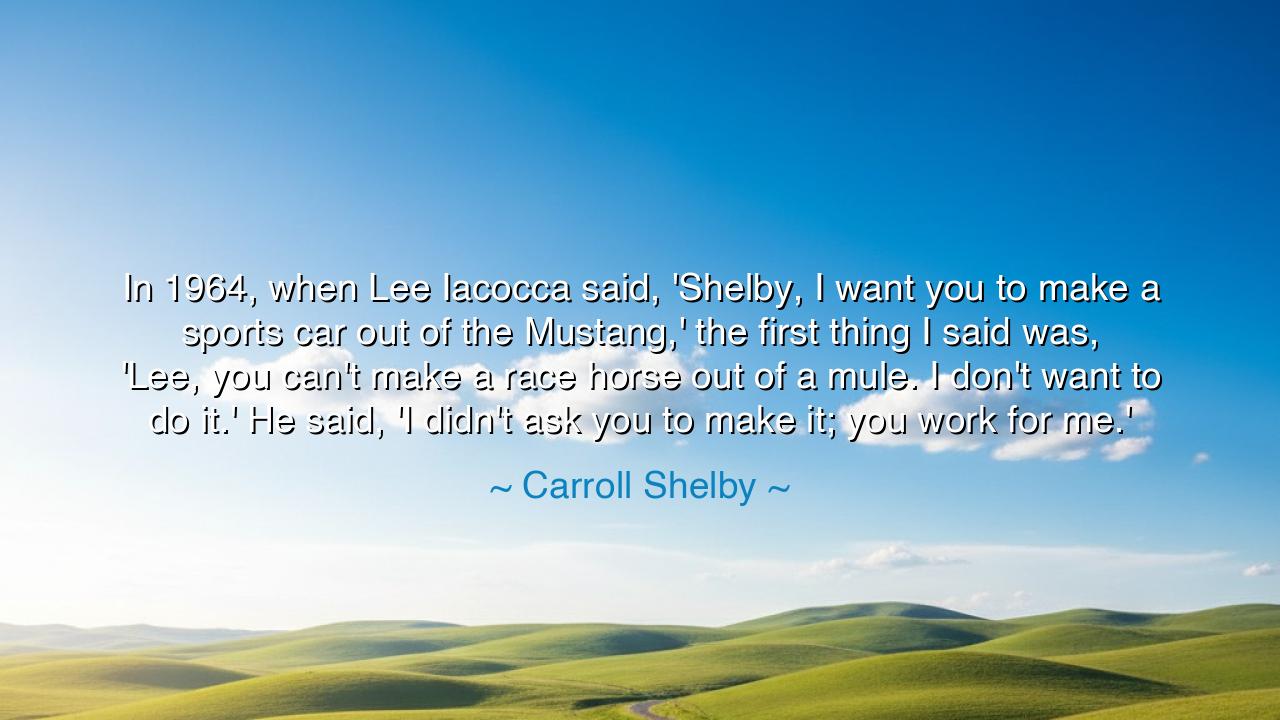
In 1964, when Lee Iacocca said, 'Shelby, I want you to make a
In 1964, when Lee Iacocca said, 'Shelby, I want you to make a sports car out of the Mustang,' the first thing I said was, 'Lee, you can't make a race horse out of a mule. I don't want to do it.' He said, 'I didn't ask you to make it; you work for me.'






The great craftsman of machines, Carroll Shelby, once recalled a moment that changed the history of automobiles: “In 1964, when Lee Iacocca said, ‘Shelby, I want you to make a sports car out of the Mustang,’ the first thing I said was, ‘Lee, you can’t make a race horse out of a mule. I don’t want to do it.’ He said, ‘I didn’t ask you to make it; you work for me.’” Within these words lies not only the tale of an engineer’s doubt and a leader’s command, but also the timeless struggle between vision and hesitation, between obedience and genius.
This quote reveals the tension between what seems impossible and what must be done. Shelby, a man who had lived among the purebred race cars of Europe, looked upon the humble Mustang and judged it unworthy of glory. To him it was a “mule,” a beast of burden, not a stallion fit for the track. Yet Iacocca, with the clarity of vision and authority of command, refused excuses. In his words, “you work for me,” we hear not arrogance, but conviction: that greatness can be forged from humble beginnings if only courage and craft are applied.
History is filled with such moments, when doubt whispered but destiny shouted louder. Consider the tale of Michelangelo, who, when first shown the flawed block of marble that would become David, protested that nothing beautiful could be carved from such ruined stone. Yet compelled by commission and by duty, he labored, and from imperfection he drew forth perfection. In the same spirit, Shelby, pressed by Iacocca’s will, took what seemed ordinary and transformed it into the legendary Shelby Mustang—a machine that would inspire awe for generations.
The meaning of this story is deeper than automobiles. It tells us that the raw materials of greatness are often disguised as mules. Rarely does destiny hand us perfect instruments. Instead, it offers flawed stone, heavy burdens, or modest beginnings. The true measure of mastery lies not in rejecting these, but in refining them until their hidden strength is revealed. What Shelby resisted became the very foundation of his fame, and what Iacocca demanded became an icon of speed and beauty.
This quote also teaches us about authority and trust. Sometimes, when we cannot yet see the path, we must walk it because another’s vision compels us. Leaders like Iacocca dare to demand the seemingly impossible, and craftsmen like Shelby prove the impossible false by their skill. Between them, greatness is born. Thus, obedience to a vision, even one we resist, can be the spark that brings forth triumph.
The lesson for us is simple and eternal: do not dismiss the “mule” that life places in your hands. Whether it is a humble task, a flawed opportunity, or a duty that feels beneath your talent, within it may lie the seed of glory. Approach it with discipline, imagination, and endurance. For the mule, under the right hands, can indeed run like a racehorse. What seems beneath you today may lift you higher tomorrow.
Therefore, let us remember Shelby’s story not only as automotive history, but as human wisdom. Let us embrace the flawed, the imperfect, the unlikely, and shape them into greatness. For destiny often comes disguised, and those who dare to labor with what they are given may create something immortal. Like Shelby, we may doubt; like Iacocca, we must believe. And in the meeting of doubt and faith, of resistance and command, lies the fire that forges legends.






AAdministratorAdministrator
Welcome, honored guests. Please leave a comment, we will respond soon